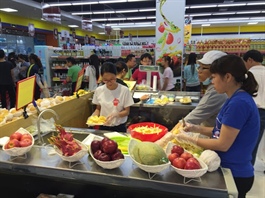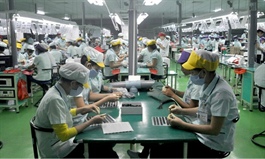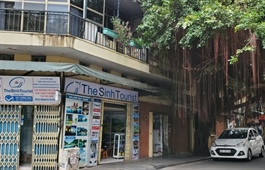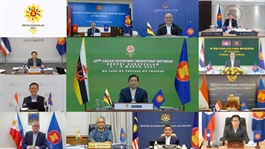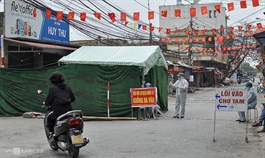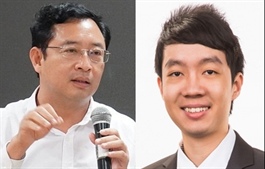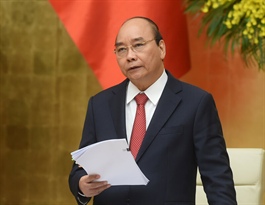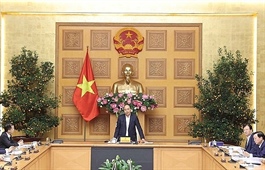A vaccine for COVID-19 and FDI gain
A vaccine for COVID-19 and FDI gain
The growing stores of COVID-19 vaccines are widely regarded as a positive factor for foreign investment mobilisation this year as the world tries to move back to some kind of normality. Deputy Minister of Planning and Investment Tran Duy Dong told VIR’s Nguyen Huong about the solutions Vietnam will take to mobilise foreign investment and move forward.
While global supply chains continue to adjust to current restrictions, what can be done to mobilise high-quality investment?
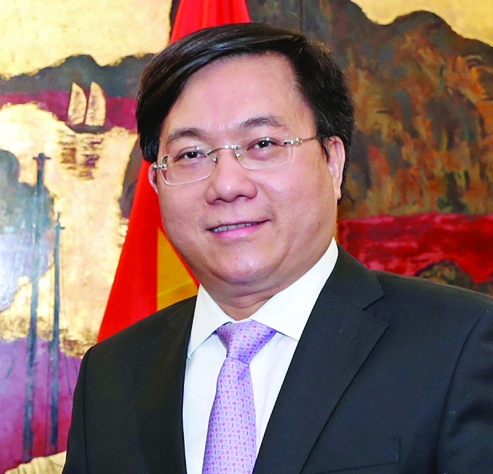
Deputy Minister of Planning and Investment Tran Duy Dong
|
Trade conflicts among major economies worldwide and the severe consequences of the pandemic since last year have been accelerating the relocation of big corporations to avoid high tariffs and reduce risks. Of these, numerous countries have also promulgated attractive policies for foreign direct investment (FDI), while Vietnam has got its own advantages to welcome investment, as well as carried out some outstanding solutions and innovative measures to meet the demand of potential investors.
Vietnam has been ready to welcome new investors based on huge clean land areas, power sources for production, high-quality human resources, supporting industries, and simplified administrative procedures.
For large-scale projects which apply high technologies, generate a lot of added value, and maintain close links with local enterprises, special incentives have already been built, and the Ministry of Planning and Investment (MPI) in collaboration with other ministries has drafted and submitted to the government.
Despite the pandemic, some online meetings, dialogues, and investment promotion conferences between Vietnamese authorities and overseas investors have been organised to update new policies, incentives, and feedback for their concerns, including some of largest technology corporations in the world.
Besides this, the MPI proactively works with diplomatic agencies, business associations, consultancies, banks, and investment funds to approach more investors that are already interested in this destination. Meanwhile, a task force responsible for FDI attraction led by Deputy Prime Minister Pham Binh Minh and supported by MPI Minister Nguyen Chi Dung has been established to call for as many foreign-invested projects as possible.
The MPI has also created more favourable conditions for foreign experts and senior engineers to enter the country to work. Despite the pandemic, last year over 10,000 experts arrived in Vietnam to carry out various business. However, there remain some obstacles in Vietnam, including institutional issues, infrastructure, and human resources. Despite this, many solutions have been taken to improve the investment climate.
Vietnam has identified a number of prioritised sectors. Of these, in which sectors does Vietnam have the competitive advantage to foster FDI attraction?
In our research based on Vietnam’s advantages and discussions with some major investors, we see some priority given to mobilising FDI in processing and manufacturing (electronics, equipment, automobiles, steel, chemicals, textiles and garments, and footwear and leather); consumption goods and retail; e-commerce; and logistics due to the favourable location, abundant human resources, and large, accessible market thanks to new-generation free trade agreements signed in recent years.
Additionally, there are a lot of opportunities for Vietnam to lure relocating and restructuring projects in such sectors as IT, high technologies, and innovation, which can enable local businesses to join their supply chains in high-added-value phases, along with training human resources, investing into research and development, and contributing to the sustainable development of the country.
There are particular policies for every locality in addition to general policies. What solutions are to be put in place to avoid a “race to the bottom” in which localities jostle to attract or retain economic activity?
Some localities issued their own incentives to lure more investment but this was already addressed a long time ago. At present, there are only general policies issued by the government in terms of mobilising FDI in particular, and localities are not allowed to build their own. However, they can support investors in land clearance, administrative procedures, human resources supply, and connecting with local supporting businesses.
Besides this, localities can organise various investment promotion activities and show off their advantages and potential. These improve the investment climate of both the province and the country.
The MPI plays the role of central-level coordinator to manage all local investment promotion activities, ensure their efficiency, avoid duplication, and ensure they are in line with the relevant FDI attraction policies.
According to the prime minister’s Decision No.03/2014/QD-TTg on the regulation of state management over investment promotion activities, the MPI reviews investment promotion programmes of every ministry, agency, and locality annually in order to manage the performance of all investment promotion activities, and call for much more reputable investors into Vietnam.
There remains risk of new outbreaks in Vietnam as international flights carry overseas experts into the country. How do you assess these risks and their impact on FDI attraction this year?
Tens of thousands of people, including overseas Vietnamese, have returned home and foreign experts arrived in the country to work. This has contributed to resuming operation of numerous businesses.
Of course, these flights carry some risks. During the last five months, the Ministry of Health and the Centre for Disease Control and Prevention have done well to manage pandemic infection rates. Individual high-profile cases have also alerted Vietnam to strengthen some solutions. Since then, the prime minister has asked localities to re-test all foreign experts that had just entered the country. Newly-arrived vaccines will partially alleviate concerns of the outbreak or increasing infection rates, and raise expectations to welcome more foreign experts and investors.
|
According to the Ministry of Planning and Investment’s Foreign Investment Agency, as of February 20, the country’s total newly-registered and added capital, as well as investment into capital contribution and share purchases amounted to $5.46 billion, equivalent to 84.4 per cent of the same period last year. Of this, there were 126 newly-registered projects (down 74.8 per cent on-year) with the total investment of $3.31 billion, down 33.9 per cent on-year. The outstanding new project in these two months are the $1.3 billion O Mon II thermal power plant in the Mekong Delta city of Can Tho, developed by a joint venture between Vietnam Trading Engineering Construction JSC and Marubeni Corporation from Japan, which received its investment certificate at the end of January. Some 115 projects (down 23.8 per cent on-year) expanded capital with a total value of $1.61 billion, 2.5 times as much as last year, largely driven by the LG Display Haiphong project which increased capital by $750 million. There were 445 instances of capital contributions and share purchases (down 71.9 per cent on-year) with the total investment of $543.1 million (down 34.4 per cent). The disbursement of foreign capital reached $2.5 billion in the first two months, up 2 per cent on-year. |







